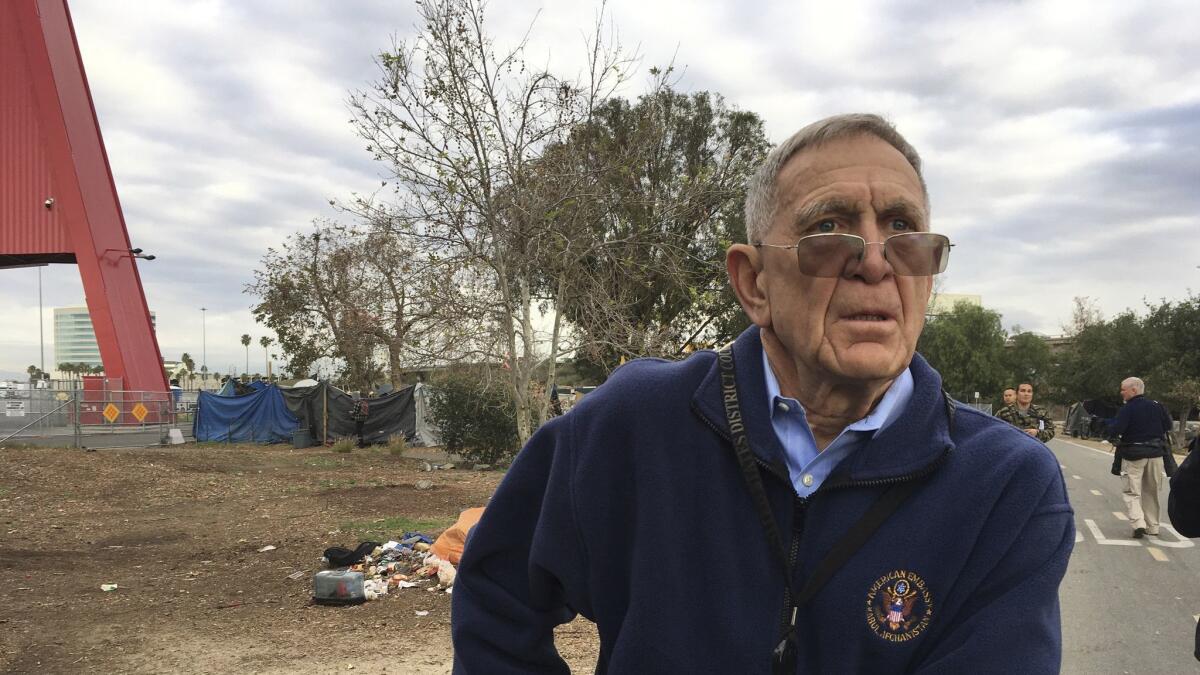Commentary: Federal judge working on homeless issues is a force of nature

- Share via
I was there, where homeless people, many with mental illnesses, couldn’t get it together enough to show up for the federal court hearing orchestrated by Judge David O. Carter Saturday at Santa Ana City Hall.
This awareness fueled my determination to attend the large gathering, despite grave concerns over the potential for a debilitating anxiety attack. Packed court hearings, filled with heated emotions, just aren’t my thing. Yet I somehow wanted to fill the void left by those who were not in attendance.
I sought safe harbor in the front row, in an oddly isolated chair, next to a space for physically disabled people to park a wheelchair. The irony was not lost. Mental disabilities are not always obvious, and that seat placement allowed me to sit through the entire hearing and remain engaged.
Lots of air, room to breathe. No overwhelming panic abruptly disorienting my senses, pulling the proverbial rug out from where I wanted to be: present.
On the other side of the open space, sat a professional-looking man, neatly dressed in a suit and tie. He looked familiar. He was an elected official, the same man who soon stood up and conceded to numerous mistakes that were made by the county of Orange.
The delivery of his admission seemed grounded as much in feelings, as it was in facts. He looked visibly shaken as he spoke. He was, after all, addressing a prominent judge in federal court. Homeless attendees clapped and cheered, as he vowed to make significant changes to increase homeless solutions in Orange County.
A gathering of defendants filled the rows directly behind us. During the breaks, I found myself meeting mayors, city managers and various city workers. They didn’t seem to know what to say to me, and I didn’t know what to say to them, although it didn’t seem to matter. I sensed that many of them just didn’t want to be there.
A collection of suits flooded the exits at the point where attendance was no longer necessary, perhaps revealing a troublesome apathy that allowed homeless problems to fester and grow in the first place. Homeless issues are complex, inconvenient and incredibly time-consuming.
The person I was most interested in meeting at the hearing was Judge Carter. One of the speakers informed us that his reputation earned him the name of a fictitious movie character, “Rambo.”
Watching media coverage of “Rambo” interacting with homeless people along the river trail was not only interesting, it was really surprising. I wanted to see if this guy was for real, or if the images merely reflected contrived photo opportunities meant for self-aggrandizing.
As attorneys hammered out negotiations behind closed doors, I approached him and we talked. My overall impression is that he is a force of nature.
Once attorneys beckoned him back toward the doorway, where negotiations were still under way, he stopped and turned in my direction. Pointing directly at me, he said, “I want to talk to you more.”
Incredibly, he gave that kind of individual attention to everyone with whom he spoke, meeting with every single homeless person who attended the hearing — those seeking vouchers for motels and those seeking shelter admissions.
Toward the end of the evening, a homeless woman who was one of the last to be seen told me that when she sleeps inside, “spaceships and aliens can’t get her.” Her motel room voucher was ending the next day, so she was looking to the attorneys who had helped her, in order to find immediate placement in a shelter. An acquaintance, who shared a motel room with her, drove her to the hearing to make sure she got there on time.
This lady was well enough to recognize she was ill, yet sick enough to be unable to make a connection between the menacing creatures invading her thoughts — and the stark reality that surrounded her.
Anosognosia — the inability to recognize her own illness — had not set in, rendering her an emblematic poster child for one of the reasons why this lawsuit came to be. Simply put, it’s a lot cheaper to treat mental illness in its earlier stages, and there is much less human suffering and degradation to endure.
Proactive, rather than reactive, as one speaker put it. A humane choice indeed.
I left around 8 p.m. Right after the hearing the suffering woman proclaimed that she would be driven to a large shelter in Anaheim the next day, where she would receive the psychiatric care she requested.
Aliens and spaceships held at bay for now.
Freelance writer and advocate for the homeless KATHY CLINKENBEARD lives in Costa Mesa.
All the latest on Orange County from Orange County.
Get our free TimesOC newsletter.
You may occasionally receive promotional content from the Daily Pilot.





